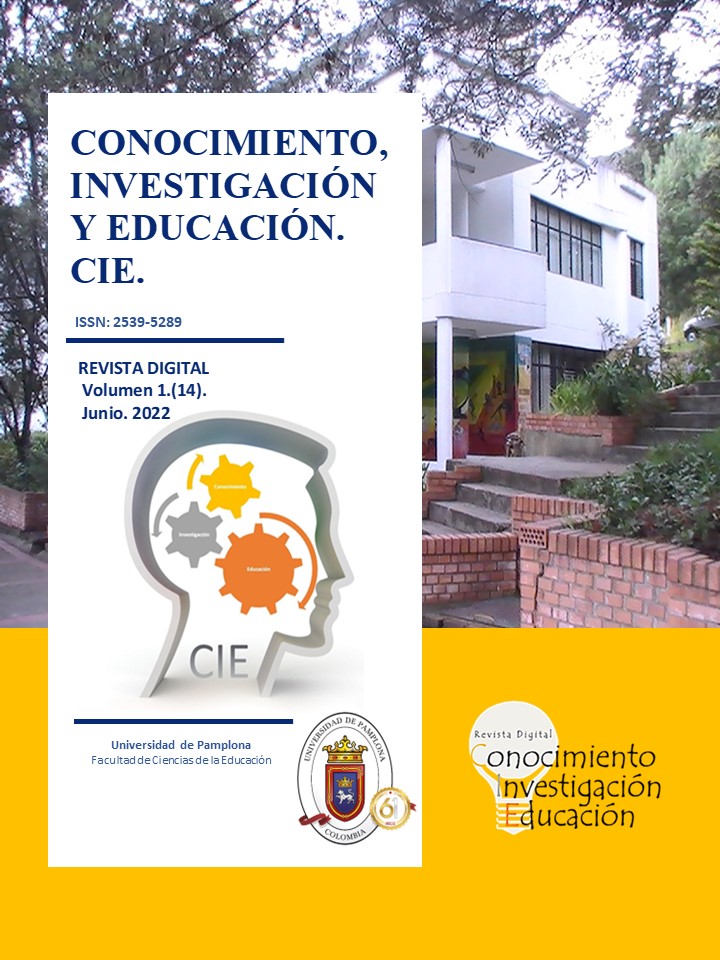Participación de la familia en el rendimiento académico de los estudiantes de Educación Primaria
DOI:
https://doi.org/10.24054/cie.v1i14.1394Palabras clave:
Participación, familia, rendimiento académico, estudiantes, educaciónResumen
La investigación tiene como propósito general “Promover la participación de las familias para el mejoramiento del rendimiento académico de los estudiantes de 3er grado “A” en la E.B.E. “Dr. José Antonio Chaves” de la parroquia Altagracia, municipio Miranda del Estado Zulia”. A través de los aportes teóricos de Curra (2010), Ribas (2015), Aguirre (2017), Castillo (2016), entre otros. La investigación está dentro del paradigma crítico reflexivo, enfoque cualitativo, método Investigación Acción Participativa, se desarrolla sobre una población conformada por 2 directivos, 2 docentes 11 padres y representantes de la institución en estudio quienes se les realizaron entrevistas. Una vez realizada las entrevistas, se llevó a cabo la triangulación entre los informantes, las teorías y la retroalimentación de las investigadoras; de la cual surgió el diseño de un plan de acción para ser ejecutado en la segunda fase de la investigación
Descargas
Referencias
Agencia de la Calidad de la Educación. (2018). Informe nacional de la calidad de la educación 2018. Los desafíos de educar para la participación y formación ciudadana. Chile.
Blanco, R. (2008). Eficacia escolar desde el enfoque de calidad de la educación. En R. Blanco (Comp.), Eficacia escolar y factores asociados en América Latina. UNESCO, LLECE.
Coleman, J. (1965). Equality of educational opportunity. John Hopkins University.
DANE. (2018). Educación formal (EDUC). Bogotá, Colombia: DANE. Recuperado de: https://www.dane.gov.co/index.php/estadisticas-por-tema/educacion/poblacion-escolarizada/educacion-formal#informacion-2018-por-secretaria-de-educacion
Edmonds, R. (1979). Effective schools for the urban poor. Educational Leadership, 37(1), 15–24.
Hernández, R., Fernández, C., & Baptista, P. (2014). Metodologías de investigación (6ª ed.). McGraw-Hill.
Hernández-Sampieri, R., & Mendoza, C. P. (2008). El matrimonio cuantitativo-cualitativo: el paradigma mixto. En J. L. Álvarez Gayou (Presidencia), 6to Congreso de Investigación en Sexología. Congreso efectuado por el Instituto Mexicano de Sexología, A.C. y la Universidad Juárez Autónoma de Tabasco. Tabasco, México.
Herrera, M. (1993). Las escuelas de prestigio y las redes escolares exitosas en Venezuela: un estudio crítico. Convenio CICE/CINTERPLAN.
Herrera, M., & Díaz, J. (1991). Descripción específica del estudio evaluativo acerca de la gestión y uso óptimo de los recursos de la red escolar Fe y Alegría. Documento inédito, UNESCO-CENDES-CICE.
Herrera, M., & López, M. (1992). Estudio comparativo de Fe y Alegría y Escuelas Oficiales (nacionales y municipales). Banco Mundial/CICE.
Instituto Colombiano para la Evaluación de la Educación (ICFES). (2018). Características de los colegios eficaces de bajo nivel socioeconómico. ICFES.
Jencks, C. S., Smith, M., Acland, H., Bane, M. J., Cohen, D., Gintis, H., Heyns, B., & Michelson, S. (1972). Inequality: A reassessment of the effect of family and schooling in America. Basic Books.
Lastra, E. F. (2001). La efectividad escolar: Un estudio de las escuelas primarias públicas en una ciudad mexicana [Tesis doctoral inédita]. Universidad de Stanford.
Murillo, F. J. (2008). Enfoque, situación y desafíos de la investigación en eficacia escolar en América Latina y el Caribe. En R. Blanco (Comp.), Eficacia escolar y factores asociados en América Latina. UNESCO, LLECE.
Plowden, B. (1967). Children and their primary schools: A report of the Central Advisory Council for Education (England), Vol. 1: Report. HM Stationery Office.
Smith, M. (1972). Equality of educational opportunity: The basic findings reconsidered. En F. Mosteller & D. P. Moynihan (Eds.), On equality of educational opportunity. Vintage Books.
UNESCO. (1997). Laboratorio Latinoamericano de Evaluación de la Calidad de la Educación. Primer Estudio Internacional Comparativo sobre Lenguaje, Matemática y Factores Asociados en Tercero y Cuarto Grado (PERCE). UNESCO.
UNESCO. (2006). Laboratorio Latinoamericano de Evaluación de la Calidad de la Educación. Los aprendizajes de los estudiantes de América Latina y el Caribe: Resumen ejecutivo del primer reporte de resultados del Segundo Estudio Regional Comparativo y Explicativo (SERCE). UNESCO.
UNESCO. (2013). Laboratorio Latinoamericano de Evaluación de la Calidad de la Educación. Tercer estudio regional explicativo y comparativo (TERCE). UNESCO.
UNESCO. (2019). Estudio Regional Comparativo y Explicativo. Manual de orientación para las escuelas y docentes (ERCE). UNESCO.
Weber, G. (1971). Inner-city children can be taught to read: Four successful schools. Council for Basic Education.
Wilches, L. A. (2010). Estudio de factores asociados a la calidad de la educación escolar de Bogotá. Educación y Ciudad, (19), 57–68.
Descargas
Publicado
Número
Sección
Licencia
Derechos de autor 2022 CONOCIMIENTO, INVESTIGACIÓN Y EDUCACIÓN CIE

Esta obra está bajo una licencia internacional Creative Commons Atribución-NoComercial-SinDerivadas 4.0.










